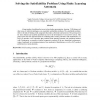Free Online Productivity Tools
i2Speak
i2Symbol
i2OCR
iTex2Img
iWeb2Print
iWeb2Shot
i2Type
iPdf2Split
iPdf2Merge
i2Bopomofo
i2Arabic
i2Style
i2Image
i2PDF
iLatex2Rtf
Sci2ools
126
click to vote
IJCSA
2007
2007
Solving the Satisfiability Problem Using Finite Learning Automata
A large number of problems that occur in knowledge-representation, learning, VLSI-design, and other areas of artificial intelligence, are essentially satisfiability problems. The satisfiability problem refers to the task of finding a truth assignment that makes a Boolean expression true. The growing need for more efficient and scalable algorithms has led to the development of several SAT solvers. This paper reports the first approach based on combining finite learning automata with metaheuristics. In brief, we introduce a new algorithm that combines finite learning automata with traditional random walk. Furthermore, we present a detailed comparative analysis of the new algorithm's performance, using a benchmark set containing instances from randomized distributions, as well as SAT-encoded problems from various domains.
Related Content
| Added | 21 Dec 2010 |
| Updated | 21 Dec 2010 |
| Type | Journal |
| Year | 2007 |
| Where | IJCSA |
| Authors | Ole-Christoffer Granmo, Noureddine Bouhmala |
Comments (0)

